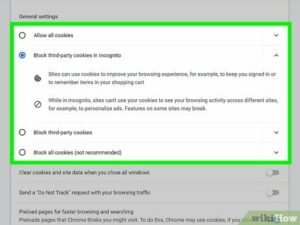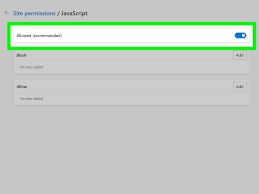How to Enable JavaScript and Cookies in a Web Browser
To enable javascript and cookies on your computer, you can visit the Internet Options window in your browser. In the Internet Options window, select “Advanced.” To enable javascript, click on the “Enable” button. This option will allow websites to use javascript to collect information on visitors’ behavior and preferences. However, if you are unable to enable javascript or cookies in your browser, you should contact your organization’s IT department for assistance.
The web browser’s default settings for cookies and JavaScript are enabled by default. You can also check whether these two features work by accessing the Settings menu. Click the three tiny black dots at the top of the browser window to reveal it. Click on Search settings. Type “site settings” in the search field. Click on the “Enable JavaScript” checkbox in the corresponding box. Click “OK.” Google

After you have enabled JavaScript, you can go to the Content section of the browser and choose the site that is using this feature. You can then select what sites use JavaScript. If you disable cookies, they are automatically deleted when you close all browser windows. However, if you don’t want your website to use these features, you can enable them individually. The settings for cookies and JavaScript are easy to find in the Chrome settings.
How To Enable Javascript And Firefox:
To enable cookies and javascript in your web browser, click on the “Preferences” menu. In the Security section, click the “Enable cookies” checkbox and then click on the “Advanced” tab. Next, click on the “Content settings” tab. Finally, click the “Reload current page” button to refresh your web page. This should enable cookies and javascript.
The advanced settings of Firefox are only accessible by visiting a special url. Type about.config in the address bar. Make sure that the url starts with “about:config”. Changing the advanced settings can mess up your browser, so be careful. You should be able to use it only for sites you trust. However, it is not necessary to change all the settings. If you’re not comfortable making changes, you can disable them if you need to.
How To Enable Javascript And Internet Explorer:
You can also change the privacy settings of your browser. For example, you can choose to enable cookies or disable them altogether. If you want to prevent tracking cookies, turn off “Allow third-party cookies” or “Private browsing mode.” Then, select a custom cookie setting and then click on the Advanced tab. Once you’ve made your changes, you can continue to use your browser. It’s as simple as that.

To enable JavaScript and cookies on your Internet Explorer browser, follow these steps. You’ll need to be using an active browser to turn them on. Click the gear icon on the toolbar in the upper right corner of the screen, then select “Internet Options.” Then, click the “Security” tab, and then scroll down to “Active Scripting.” Once you’ve enabled JavaScript, you’ll need to check that it’s working before continuing.
How To Enable Javascript And Opera:
If you’ve disabled JavaScript on your browser, you’ll notice that many websites’ menus and login systems won’t work properly. Sometimes, users disable it on accident. Fortunately, enabling it is easy to do and doesn’t require any special knowledge. Once you’ve enabled JavaScript in your browser, you can click the “OK” or “Back” button to exit the window.
You can enable cookies and JavaScript in Opera by going to its preferences pane. This is located in the upper-left corner of the browser window. To enable cookies and JavaScript, select the ‘advanced’ tab. Alternatively, you can click on the ‘content’ tab and select ‘preferences’. You can also go to the Privacy and Security section to enable cookies and JavaScript.
How To Enable Javascript On iPhone:
Another way to block cookies and JavaScript is to specify which websites you want to block. In Opera, you can choose to enable JavaScript for specific websites, domains, or entire sites. To block a website, first navigate to the Block section and then select the ‘Add URL’ option. You can specify a domain or site. Otherwise, you can enable JavaScript for all websites. However, if you don’t use JavaScript on your website, it can potentially be dangerous. You should block this script if you aren’t sure.
Cookies And JavaScript On Web Browsers:
- Open Google Chrome.
- In the upper right corner, click the Menu button ⋮
- Then select Settings.
- Under Privacy & Security, click Site Settings.
- Scroll down until you see the Contents section.
- Select Cookies and other site data,
- Then select Allow all cookies.
You can enable cookies and JavaScript by toggling the option in Firefox 2 or Opera. Both Chrome and Safari will automatically enable them. On the other hand, you can disable cookies and JavaScript by contacting your company’s IT staff. Luckily, you can always disable cookies and JavaScript if you don’t need them. The options are identical for Opera for iOS/iPadOS, so you can keep using Opera with these two browsers.

Leave a Reply